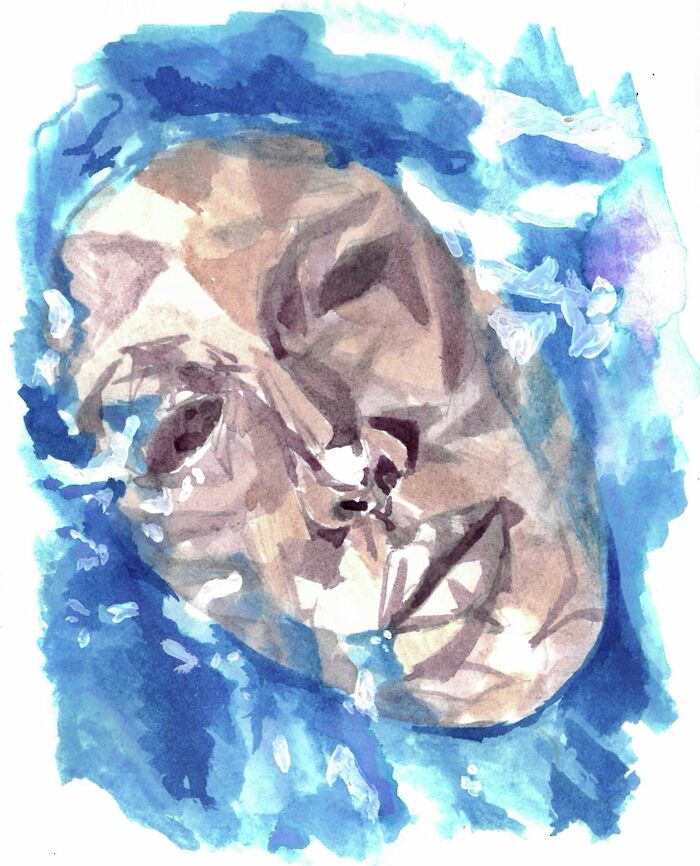A Poem for Happiness
Alice Brewer shares the joyful optimism of Frank O’Hara’s ‘Having a Coke With You.’

I first found out about Frank O'Hara’s ‘Having a Coke With You’ from an album on Spotify where he reads lots of his more well-known poems aloud. O'Hara’s tenor New-York accent cracks slightly under the limitations of the mid-century recording equipment, giving the register a slightly kitschy sort of register that fits in with the exuberant materialism and campness of his style in general. Even more theatrical, more camp, is the video of him reciting ‘Having a Coke With You’. You can find it on Youtube: he holds a freshly lit cigarette as he speaks, letting it burn almost all the way to the end, unsmoked.
The opening lines run on directly from the title, and it’s probably worth quoting at length:
‘is even more fun than going to San Sebastian, Irún, Hendaye,
Biarritz, Bayonne
or being sick to my stomach on the Traversera de Gracia in
Barcelona
partly because in your shirt you look like a better happier
St Sebastian
partly because of my love for you, partly because of your love for yogurt’
The lines have such a sense of – and I do hate to use the term – self-actualisation. I’ve sat many times in Fitzbillies, being sick to my own stomach with coffee and apples (which together confer hubris, then nausea) thinking about the things I need to do and the books I’m failing to understand. The opening comparative clause gives a sense of striving that has been resolved by whoever the subject of the poem is. (I’m sure any good work on the New York School will reveal who this is). It is so so joyful. I remember at the start of this year someone told me that most Cambridge English students come here liking TS Eliot, and leave liking Frank O'Hara.
So much time is spent striving towards something, and days can easily become repetitive: each week another essay to anxiously write. O'Hara’s insistence on comparisons and comparatives posits this sense of striving, only to undercut this by suggesting the opposite within these comparisons. There’s a sense of resolution – a movement away from the endless times and places and ideas that pile up, championing one moment in which they seem to disappear.
My degree is really just a lot of ink, and not quite the drama I make it out to be each week.
In citing various paintings that he no longer needs, O'Hara eschews all the quasi-academic art history stuff that constituted a big part of his life – he was for a while a steward at the Met. I find essay writing very referential: the pages of citations at the ends of chapters of books that I haven’t read (and really should) and the theory – usually Myth Today by Roland Barthes – that I still don’t entirely understand, even reading it for the fifth time. The books all cite each other, and I’m constantly grasping and floundering about.
O'Hara posits a moment in which this is all done away with, in the four o clock New York light:
‘and the portrait show seems to have no faces in it at all, just paint
you suddenly wonder why in the world anyone ever did them
I look
at you and I would rather look at you than all the portraits in the
world
except possibly for the Polish Rider occasionally […]’
They’re such lovely lines, conferring that sense of cheeriness on the curve towards happiness in which your life will never be quite as sad, quite as difficult, before that person, and that moment. My degree is really just a lot of ink, and not quite the drama I make it out to be each week.
The poem is really hard to quote because it mostly depends on its entirety, and how it all leads on from the one moment posited in the title. It portrays the optimism and joy of finally feeling like you’re in your real life. For once. Even amongst discarded coke cans, or sub-par essays.
 Comment / Plastic pubs: the problem with Cambridge alehouses 5 January 2026
Comment / Plastic pubs: the problem with Cambridge alehouses 5 January 2026 News / Cambridge businesses concerned infrastructure delays will hurt growth5 January 2026
News / Cambridge businesses concerned infrastructure delays will hurt growth5 January 2026 News / New movement ‘Cambridge is Chopped’ launched to fight against hate crime7 January 2026
News / New movement ‘Cambridge is Chopped’ launched to fight against hate crime7 January 2026 News / AstraZeneca sues for £32 million over faulty construction at Cambridge Campus31 December 2025
News / AstraZeneca sues for £32 million over faulty construction at Cambridge Campus31 December 2025 Interviews / You don’t need to peak at Cambridge, says Robin Harding31 December 2025
Interviews / You don’t need to peak at Cambridge, says Robin Harding31 December 2025










